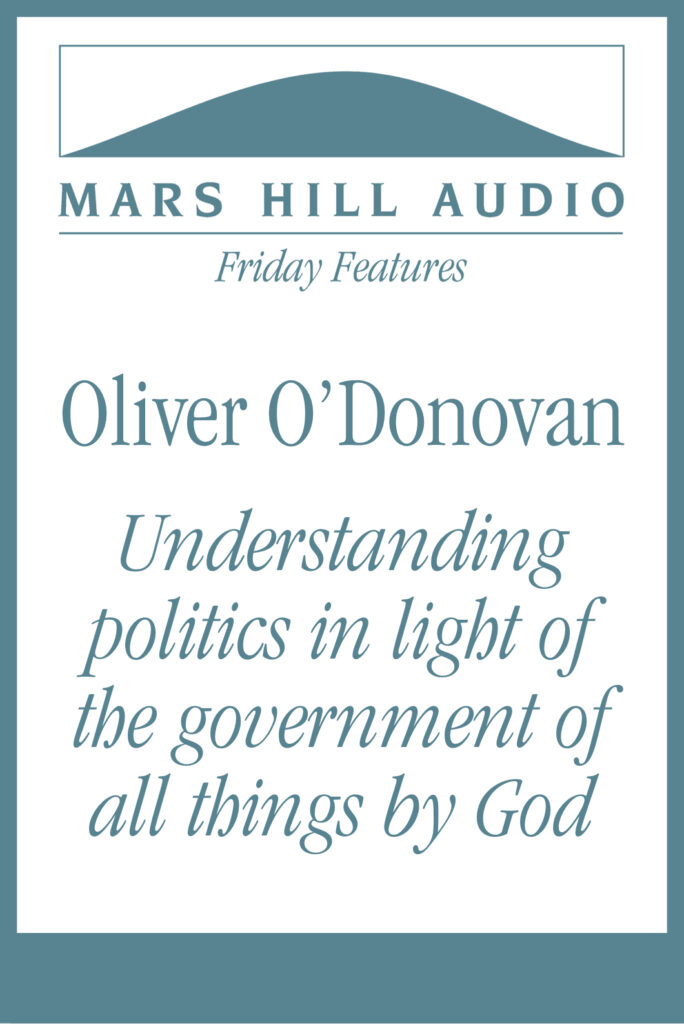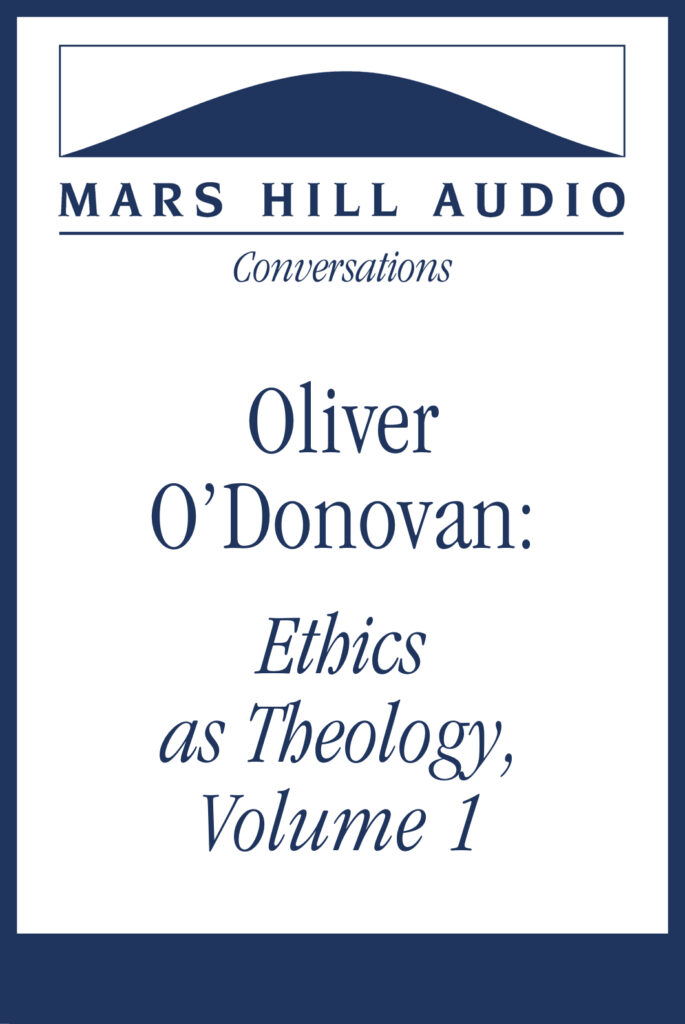released 6/5/2020
“We must look to the horizon of God’s redemptive purposes if we are to grasp the full meaning of political events that pass before our eyes.” So writes moral philosopher Oliver O’Donovan. “This means that, first, theology must do its work equipped with a full array of political concepts, not just within a narrowly personal and therapeutic framework. And second: thinking about politics needs a full set of theological categories to understand its function properly.”
In a 90-minute conversation with Matthew Lee Anderson and Ken Myers, Oliver O’Donovan explains some of the central themes of his work in political theology. This discussion was held on Capitol Hill in 2013, and includes references to O’Donovan’s books The Desire of the Nations, The Ways of Judgment, and others.
91 minutes
PREVIEW
The full-length track for this audio is only available to paid members and to listeners with a free Visitor’s Pass. If you are a member, log in here. If you would like a Visitor’s Pass, sign in here. You may purchase one of our complete memberships here. Happy listening!
Moral philosopher Oliver O’Donovan discusses the first two volumes of his three-volume set, Ethics as Theology. During the interview, O’Donovan identifies important touchstones that have guided his thinking about moral reflection, including his insight in Resurrection and Moral Order (1986) that moral thinking and action proceed from, and must resonate with, the realities of the created order. O’Donovan also reflects upon the significance of the thinking moral subject as well as what form of moral inadequacy the “life of the flesh” suggests.
Related reading and listening
- A more robust account of political life — FROM VOL. 138 John Milbank and Adrian Pabst on why politics needs to recognize the human soul in its depth (and what happens when it doesn’t). (51 minutes)
- Against hacking babies — Oliver O’Donovan raises questions about IVF and the technologically ordered motive for efficiency
- Impact of “infotainment” on community — Neil Gabler and C. John Sommerville discuss how the mentalities conveyed by our experience with communications media work against the nurturing of community. (36 minutes)
- Recognizing the Puritan flavor of “America” — George McKenna on the originally theocentric vision for the American vocation
- Critiquing “empire criticism” — Allan Bevere and Peter Leithart evaluate “empire criticism,” a way of reading the New Testament with an anti-imperial focus. (36 minutes)
- The fatal polytheism of late liberalism — Oliver O’Donovan on the failure that leads to social collapse, marked by conflict, suspicion, and violence
- Insisting that political leaders are incapable of obeying Christ — Oliver O’Donovan on the unintended consequences of the First Amendment to the U.S. Constitution.
- The gift of objective reality — Moral philosopher Oliver O’Donovan makes an argument for the consistency of the idea of law when it is conceived in a theological context. (40 minutes)
- Learning to live interrogatively — Matthew Lee Anderson reflects on the fact that questions can be asked about faith from a posture of doubt or from an eagerness to grow in understanding. (42 minutes)
- Freedom as conformity to reality — W. Bradford Littlejohn summarizes the definitions of liberty offered by Richard Bauckham and Oliver O’Donovan
- Anderson, Matthew Lee — FROM THE GUEST PAGE: Matthew Lee Anderson is an Assistant Professor in the Honors Program at Baylor University and is the Associate Director of Baylor in Washington. He is an Associate Fellow at the McDonald Centre for Theology, Ethics, and Public Life at Oxford University.
- The sovereignty of love — In this 2022 lecture, Oliver O’Donovan explains the historical background — and present consequences — of the assertion by Jesus of two great commands. (67 minutes)
- O’Donovan, Oliver — FROM THE GUEST PAGE: Oliver O’Donovan held teaching posts at Wycliffe Hall, Oxford and Wycliffe College Toronto before becoming Regius Professor of Moral & Pastoral Theology and Canon of Christ Church at the University of Oxford in 1982.
- Why kings are compelling — Historian Francis Oakley describes how the modern idea of “secular” politics is a striking departure in human history. (32 minutes)
- Mars Hill Audio Journal, Volume 159 — FEATURED GUESTS:
Kirk Farney, Andrew Willard Jones, James L. Nolan, Jr., Andrew Kaethler, Peter Ramey, and Kathryn Wehr
- Conscience seared with a red-hot iron — Oliver O’Donovan on the convicting role of a good conscience
- Culture in light of Easter — Oliver O’Donovan rejects a gnostic reading of redemption
- Mars Hill Audio Journal, Volume 154 — FEATURED GUESTS:
Felicia Wu Song, Michael Ward, Norman Wirzba, Carl Trueman, D. C. Schindler, and Kerry McCarthy
- Religion within the bounds of citizenship — In a 2006 lecture, Oliver O’Donovan argues that the conventional way of describing Western civil society creates obstacles to the participation of believers (Muslim, Christian, and other). (68 minutes)
- Republican freedom — and ideological flexibility — Mark Noll on the novelty of America’s Christian republicanism
- The purpose of government and God’s eternal purpose — Philip Turner on understanding the state in light of the eschatological reality of the Church
- The Church and the powers that be — Historian Mark Noll summarizes Christian ideas about political life in the last few centuries, examining how those ideas were worked out in various contexts in Western Europe and North America. (39 minutes)
- Politics in light of the Ascension — Oliver O’Donovan on the necessity of situating all political authority within redemptive history
- A foretaste of the kingdom of God — Oliver O’Donovan on the sovereignty of love
- Loving relationships in community — In conversation with moral philosopher Oliver O’Donovan, and with readings from his book, Entering into Rest, Ken Myers explores a central theme in O’Donovan’s work: that we are created to enjoy loving relationships in community. (27 minutes)
- The first virtue of citizenship: Taking the law seriously — Oliver O’Donovan reflects on how the reality of the Kingship of Christ must be affirmed as a present reality
- Reasoning about values — Revisiting a 1974 text that examined the mutual animosities of the 1960s
- “Whose kingdom shall have no end” — Oliver O’Donovan and his mentor, George B. Caird, offer lessons from the book of Revelation for thinking about politics
- The social context of freedom — Brad Littlejohn talks about the necessity of a more expansive understanding of freedom, one which recognizes that we are really only free within the social experience of shared meaning and mutual recognition. (17 minutes)
- Learning about the meaning of government — In a telephone conversation during COVID-19 lockdowns, Oliver O’Donovan talks about lessons we can learn about the proper role of government from our experience of pandemics and quarantine. (51 minutes)
- Ethics as Theology, Volume 2 — Drawing from St. Augustine and figures such as Aelred of Rievaulx, Oliver O’Donovan describes how the Church, communication, community, and friendship all significantly contribute to how we understand the role of love in both ethical and political reflection. (52 minutes)
- Ethics as Theology, Volume 1 — Moral philosopher Oliver O’Donovan discusses the first two volumes of his three-volume set, Ethics as Theology. Among other topics, he reflects on the significance of the thinking moral subject as well as what form of moral inadequacy the “life of the flesh” suggests. (58 minutes)
- The inevitability of escalating public animosity — With excerpts from books and lectures by Alasdair MacIntyre, Oliver O’Donovan, and Wendell Berry, Ken Myers argues that modern political theory has guaranteed increasing levels of public conflict. (19 minutes)
- Mars Hill Audio Journal, Volume 139 — FEATURED GUESTS:
W. Bradford Littlejohn, Simon Oliver, Matthew Levering, Esther Lightcap Meek, Paul Tyson, and David Fagerberg
- Mars Hill Audio Journal, Volume 138 — FEATURED GUESTS:
John Milbank, Adrian Pabst, Glenn W. Olsen, Rupert Shortt, Oliver O’Donovan, David Bentley Hart
- Oliver O’Donovan on ethics as theology — Oliver O’Donovan explains how moral deliberation always occurs in anticipation of the eschatological fulfillment of redemption. (9 minutes)
- The leaning tower of gabble — Oliver O’Donovan on how authority and language connect us with reality and thus sustain community
- Discerning the spirit of the age — Oliver O’Donovan on the difficult but essential task of reading our times
- Mars Hill Audio Journal, Volume 133 — FEATURED GUESTS:
Darío Fernández-Morera, Francis Oakley, Oliver O’Donovan, Thomas Storck, John Safranek, Brian Brock, and George Marsden
- The body’s goodness (and beyond) — Oliver O’Donovan on what the erotic body is for
- Command and liberation — Oliver O’Donovan on the freedom of living under authority
- Mars Hill Audio Journal, Volume 127 — FEATURED GUESTS:
Christopher Shannon, Kevin Vanhoozer, Oliver O’Donovan, Rebecca DeYoung, Thomas Forrest Kelly, and Calvin Stapert
- The rulers of the world bowed before Christ’s throne — Oliver O’Donovan on Christendom and the Church’s mission
- A society without purpose — Oliver O’Donovan on the eighteenth-century sources of radical secularism
- The Church as a public reality — William Cavanaugh on how we must be disciples in public, not just citizens
- How communities remember who they are — Oliver O’Donovan on the necessity of tradition in sustaining communal identity
- How the Church promotes the cause of freedom — Oliver O’Donovan: “We discover we are free when we are commanded by that authority which commands us according to the law of our being, disclosing the secrets of the heart.”
- Civil religion and other forms of cultural captivity — Oliver O’Donovan on the danger of accommodating the demands of the Gospel to the expectations of society
- Mars Hill Audio Journal, Volume 109 — FEATURED GUESTS: Douglas Coupland, Charles Mathewes, William T. Cavanaugh, William Dyrness, Steven Guthrie, and Susannah Clements
- Joshua P. Hochschild: “Globalization: Ancient and Modern” — Joshua P. Hochschild examines the effects of globalization on local communities and argues for the need for reflection on the ends of politics given the ends of human beings. (36 minutes)

